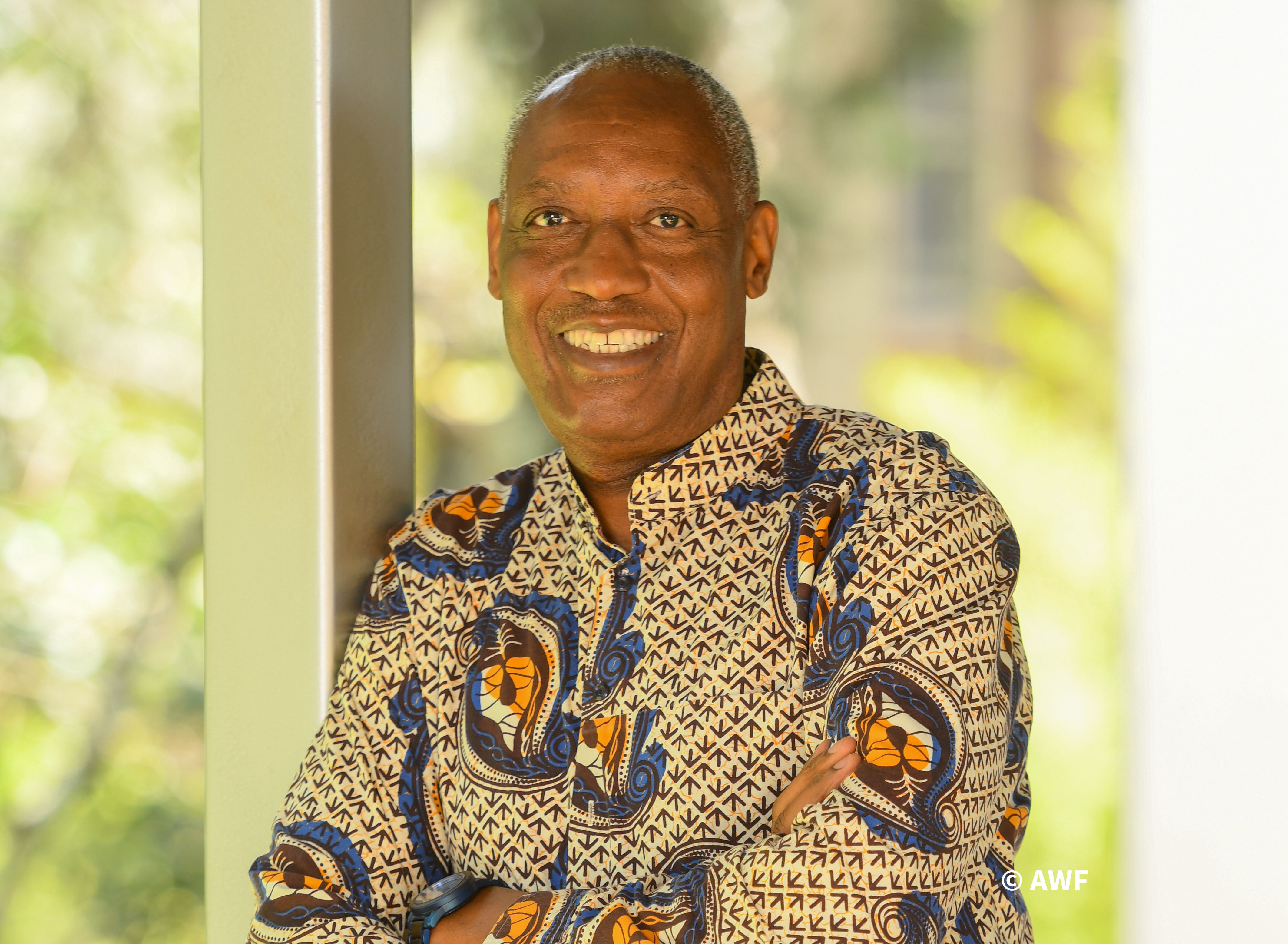Kaddu Sebunya's perspective: Raising a generation of future African leaders

Simangele Msweli, African Wildlife Foundation's Senior Manager for the Youth Program, had a brief sit down with Kaddu Sebunya as the world celebrated Africa Youth Month to gauge his sentiments on how to raise a generation of future African leaders in conservation.
You are a seasoned conservationist, and that naturally comes with many challenges in a very diverse continent that, despite massive conservation efforts, continues to lose its biodiversity. What are some of the challenges you and leaders of your generation have faced in conservation, how have you addressed them, and what lessons will you like emerging conservation leaders to draw from those experiences?
As a seasoned conservationist in Africa, I've encountered a myriad of challenges that stem from the incredible diversity of our continent, both in terms of biodiversity and the unique socio-economic landscapes. One of the prominent challenges has been the persistent loss of biodiversity despite massive conservation efforts. Climate change, in particular, has exacerbated this issue, altering ecosystems and threatening the foundations of the wildlife we strive to protect.
In addressing these challenges, leaders of my generation have recognized the importance of holistic approaches that integrate conservation efforts with climate change mitigation strategies. We've learned that a siloed approach is no longer practical. Instead, we've embraced interdisciplinary collaboration, working closely with climate scientists, policymakers, local communities, and even ‘unconventional sectors’ like agriculture, business, private, health, political leadership, and education. Through this, we've been able to develop adaptive conservation strategies that not only protect wildlife but also address the broader environmental issues affecting our continent.
For emerging conservation leaders, the critical lesson is to be adaptable and open to collaboration. The challenges we face are multifaceted, and solutions require diverse expertise. It is crucial to engage with local communities, understand their needs, and involve them in conservation. Additionally, leveraging technology and data-driven approaches has proven essential in monitoring and responding to changes in biodiversity and climate patterns.
Emerging leaders must build from existing work, and senior leaders must hand over the baton. Do you see a gap in intergenerational knowledge transfer and collaboration in Africa? If yes, how can this be addressed or strengthened?
Intergenerational knowledge transfer and collaboration are vital for the continuity and success of African conservation efforts. While there have been commendable strides, a noticeable gap still exists in seamlessly passing the baton from senior leaders to emerging ones. This gap is often attributed to factors such as limited platforms for mentorship, insufficient resources, and the rapid pace of environmental change.
To address this, it is imperative that senior leaders actively engage in mentorship programs and knowledge-sharing initiatives. Creating structured mentorship opportunities where experienced conservationists guide and empower emerging leaders can bridge the gap. Additionally, fostering collaboration between generations through joint projects and research initiatives can enhance the transfer of skills and knowledge.
It's crucial for emerging leaders to seek mentorship actively and for senior leaders to recognize the importance of nurturing the next generation. A collaboration and knowledge exchange culture can ensure a smoother transition and a more robust foundation for future African conservation efforts.
You were instrumental in driving the AWF 10-year strategy launched in 2020, a document that I relied on to give me direction as I mapped out the AWF Youth Program Plan. What non-negotiables existed when creating that organization-wide strategy?
Coming into my role, I had been in so many spaces interacting with young minds who formed the basis of my thinking while leading the team through the drafting processes. Thus, having listened keenly, I knew the only way we could achieve the goals was through the deliberate engagement of young leaders like yourself who had been part of several fellowships and building momentum to bring together the numerous networks that often operated in isolation. That was my non-negotiable. An inclusive approach that brings together African voices with a common agenda to see the continent thrive. Sustainable development was at the heart of what the collective teams perceived and sought to achieve, and bringing in the people element, especially youth, as a critical driver to our success unlocked the missing link.
In this Africa Youth Month, what message do you have for African youth who are yet to be a part of the conservation movement and those who are already in the conservation conversation?
On this Africa Youth Month, I extend a message to those who are yet to be part of the conservation movement and those already actively involved in conservation initiatives. To the youth yet to be engaged, I encourage you to recognize the pivotal role you can play in shaping the future of our continent. Conservation is the backbone of your future, and you are the custodians of that future. Conservation is necessary for good fresh water, clean air, good security, and bacteria that affect our health. Your energy, passion, and fresh perspectives are, therefore, invaluable assets in the fight for environmental sustainability.
For those already in the conservation movement, I applaud your commitment. Your efforts contribute significantly to the conservation of Africa's unique biodiversity. My message to you is one of continued perseverance and innovation. Embrace new technologies, collaborate across disciplines, and empower fellow youth to join the cause. The future of our continent's natural heritage depends on the collective actions of the next generation.
Remember, conservation is not a choice; it's a responsibility we owe to the generations that will follow. Let us work together to ensure a thriving and resilient Africa for all its human and wildlife inhabitants.
>Find out why we need more young African biodiversity scientists